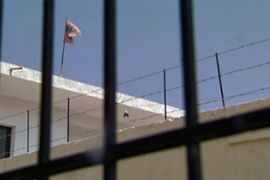UN suspects torture at Guantanamo
Investigator says detainees are not being prosecuted to hide prisoner abuse.

No decision had been made to either prosecute or release the remaining 150, including many so-called “high value” detainees, he said. Some have been held for six years without trial.
“There is not enough evidence that could be presented, even to a military commission chaired by a military judge. Partly there may not be evidence and partly the risk of issues of torture being raised is too high,” Scheinin told a news briefing.
|
“The destruction of video tapes on CIA interrogations is one more argument that supports the contention that the CIA has been involved and continues to be involved in the use of interrogation techniques that violate the absolute prohibition against torture” Martin Scheinin, UN special rapporteur on human rights |
“Bringing them to court would bring to the court’s attention the method through which the evidence, including the confessions, were obtained.
“So this is one further affirmation of the conclusion that the CIA or others have been involved in methods of interrogation that are incompatible with international law,” he said.
George Bush, the US president, insists that the US does not engage in torture, but has refused to disclose what interrogation methods are used at Guantanamo Bay and elsewhere.
In all, 800 people have been held at the Guantanamo prison since it opened in January 2002, Scheinin said.
Meanwhile, the White House contends the naval base is outside US territory so constitutional protections do not apply.
Scheinin told the UN Human Rights Council on Wednesday that his Guantanamo visit had stoked his concerns about the fairness of trials conducted there.
Interrogation techniques
The pre-trial hearing of Salim Ahmed Hamdan was held to determine whether he is an enemy combatant who can be tried on war crimes charges in a US military tribunal.
He has acknowledged working for Bin Laden but denies being a member of al-Qaeda or taking part in attacks, including the 2001 attacks on New York and Washington.
Military prosecutors denied a request by his defence lawyers to call senior al-Qaeda suspects as witnesses to testify on Hamdan’s role, according to Scheinin.
“This is illustrative of the tightness of the regime in which the high value detainees are held, which of course gives further suspicion to the inference that they have in their possession information concerning the interrogation techniques used upon them, which must not come into daylight,” he said.
“And therefore their prosecution even before the military commissions is excluded for the time being,” Scheinin added.
The Finnish law professor also voiced concern at the recent revelation that the CIA had destroyed videotapes in 2005 that recorded al-Qaeda suspects undergoing “water-boarding”, a simulated drowning technique, which he said amounted to torture.
“The destruction of video tapes on CIA interrogations is one more argument that supports the contention that the CIA has been involved and continues to be involved in the use of interrogation techniques that violate the absolute prohibition against torture,” he said.